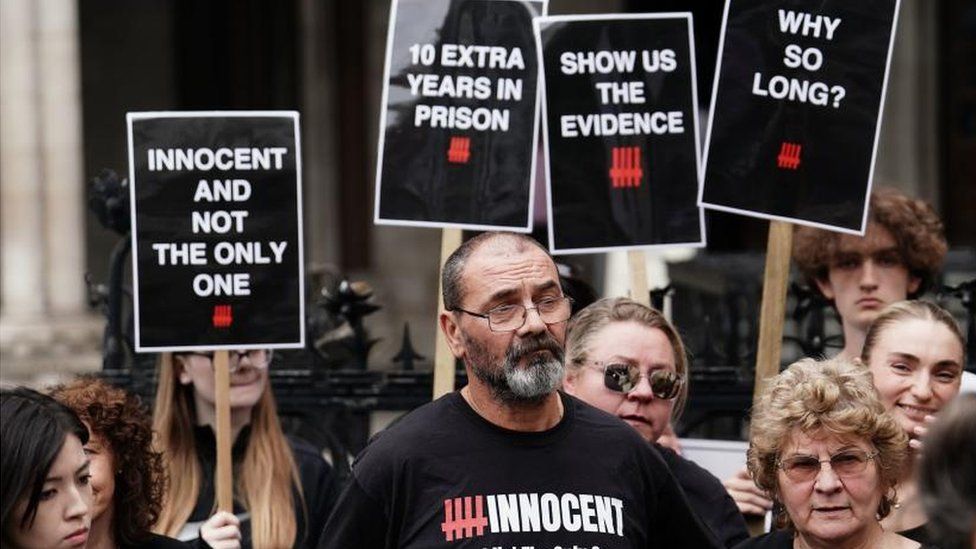
Andrew Malkinson, who was wrongly convicted of rape, had called for the change
A controversial rule which saw living costs deducted from compensation paid to wrongly imprisoned people has been scrapped.
The government announced the change on Sunday after the case of Andrew Malkinson, who spent 17 years in jail for a rape he did not commit, prompted calls for it to be overhauled.
He welcomed the move but said he still faces a two-year wait for his payment.
MPs said individuals whose payments were reduced should now be reimbursed.
People who are wrongly jailed for more than 10 years can be paid up to £1m under a government compensation scheme.
But since a House of Lords ruling in 2007, that total figure can be reduced to take into account “savings” individuals made on things like housing and food while imprisoned.
Mr Malkinson has called for the living costs rule to be removed since the Court of Appeal cleared him last month of a 2003 rape in Salford.
He was convicted by a jury on the basis of a prosecution which relied solely on identification evidence but a new DNA investigation has now linked another suspect to the crime.
Mr Malkinson was originally sentenced with a seven-year minimum term but was held for much longer because he refused to admit to a crime he knew he did not commit.
He was released in 2020 having always maintained his innocence and could now be in line for compensation after his conviction was formally quashed after his latest appeal.
Greater Manchester Police apologised to him last month and admitted their investigation resulted in a “grave miscarriage of justice”.
Mr Malkinson has described it as “sickening, abhorrent, repugnant” that a percentage of his compensation could have been reduced before Sunday’s announcement.
Justice Secretary Alex Chalk confirmed the rule would be scrapped, calling it a “common sense change which will ensure victims do not face paying twice for crimes they did not commit”.
He said: “Fairness is a core pillar of our justice system and it is not right that victims of devastating miscarriages of justice can have deductions made for saved living expenses.”
But the government has not committed to reimbursing wrongly convicted people who have had the deduction applied to their compensation since the rule was introduced.
Speaking to the BBC, Mr Malkinson said: “It’s a step in the right direction. But there’s much more that needs changing too.
“You know, you don’t want to just put a sticking plaster on something that’s mortally wounded.”
He called for an overhaul of the jury and appeals system to give wrongly convicted people more protections, and said he believes “there should be consequences” for those who secured his imprisonment.
Mr Malkinson said even with the living costs rule removed, he expects to wait two years for any compensation while the independent board which determines how much he is entitled to makes its decision.
He continued: “I’m struggling. I’m living on benefits. I’m jobless, I’m homeless pretty much… I’m pretty much bereft of everything.”
Calling for the system to be speeded up and requirements to be simplified, he said: “It’s a silly barrier that’s been artificially erected… it’s inexcusable. It’s not justified.”
A House of Commons library document from 2015 describes compensation as “the exception rather than the rule” in miscarriage of justice cases.
Emily Bolton, director of the charity Appeal and Mr Malkinson’s solicitor, said some wrongly convicted people are “denied compensation altogether because of a restrictive test which flies in the face of the presumption of innocence”.
She added: “The state robbed [Mr Malkinson] of the best years of his life. Changing this one rule is not an adequate response.
“We need a complete overhaul of the appeals system, which took two decades to acknowledge this obvious miscarriage of justice.”
There have been calls from some MPs for the government to review cases where compensation payments have had living costs deducted, and to reimburse those individuals if necessary.
Watch: Andrew Malkinson speaks to Radio 4’s Today programme about his first night of freedom
The chair of the Commons Justice Committee, Conservative MP Sir Bob Neill, told the BBC: “I’m very glad that the government have listened to what I think was the overwhelming reaction from the public and politicians about this.”
He continued: “There is a bigger piece of work that needs to be done about reforming compensation, both for victims of crime and for victims of miscarriages of justice, because the process is long-winded.”
In a separate interview with the PA news agency, Sir Bob said: “I wonder if the government could consider ex-gratia payments on a case-by-case basis to make up for that if people can demonstrate they fulfil all the criteria.”
Liberal Democrat justice spokesman Alistair Carmichael echoed that sentiment, calling on the government to review past cases and “compensate these individuals fully”.








